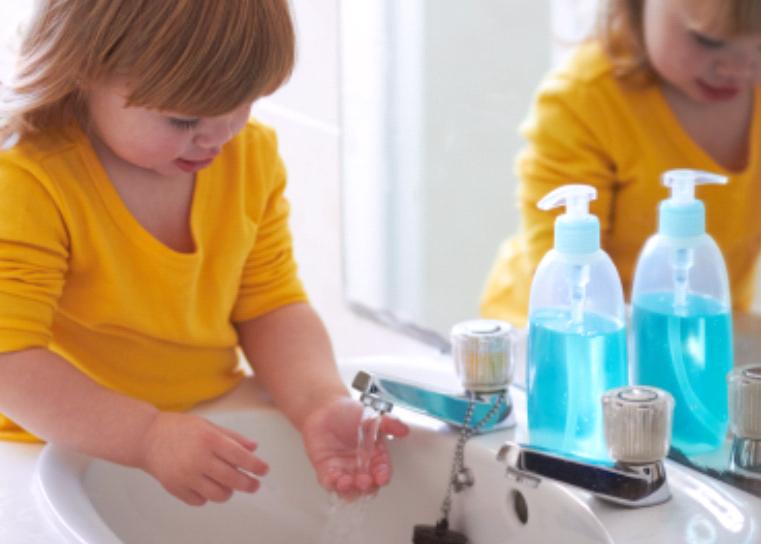 Nothing saps your energy and keeps you from feeling your best like a head cold, no matter what the time of year. Colds can come at any time, and flu season typically runs from October through May, peaking in February. You must be proactive to help your kids understand how to develop healthy habits.
Nothing saps your energy and keeps you from feeling your best like a head cold, no matter what the time of year. Colds can come at any time, and flu season typically runs from October through May, peaking in February. You must be proactive to help your kids understand how to develop healthy habits.
As soon as your child is old enough to understand that “germs are not our friend”, you should encourage your child to do the following:
- Wash their hands – Remind children to always wash their hands before eating and after going to the bathroom. Try to instill in them the importance of washing their hands after touching animals, garbage, after gym class or recess, and after blowing their nose, coughing or sneezing. Unfortunately, a sink is not always available, so ensure your child always has hand wipes or a small bottle of gel hand sanitizer in their backpack or pocket.
- Keep their hands away from the face – School is a germ-laden environment where students must touch a multitude of germy surfaces in the cafeteria, bathroom, door handle to the classroom – even the pencil sharpener.
- Cover coughs and sneezes – Tell children that they should be considerate of their classmates, friends and family members and not spread germs by encouraging them to cough into their elbow. Demonstrate to young kids how this is done.
- Use the bottled water only – Tell your children to use the bottled water you packed in their lunch instead of queuing up at the water fountain.
- Avoid sick pals – Encourage your children to be mindful of classmates or friends who are obviously sick, and should be home. Suggest that they steer clear of the sick kids to avoid becoming ill themselves.
While you don’t want to encourage your child to become a germaphobe, you don’t want them coming home sick all the time either. Help them understand how germs make you feel miserable, and when your child follows the guidelines suggested above and your valuable advice, be sure to praise them, so that shunning germs becomes the norm for them.
Encourage children to eat healthy
Unless your elementary school children have a large allowance and stop at the convenience store on the way home with their friends, they’ll be eating most of their meals and snacks at home, so this is your chance to shine and nurture them to keep them fit and healthy. Much is made today of eating healthy and staying away from salty or sugary snacks.
You can start their day off right if you forget that donut on the fly and create a wholesome, nourishing meal to start their day. That jelly donut or sweet roll will be in their toes by second period, even though it was mighty tasty. They might even have a “sugar high” from it, just like from eating spoonfuls of sugary sweet cereals. Aim to send your children out the door with a protein-rich, low-sugar breakfast like a yogurt parfait with berries and honey, a bowl of oatmeal or an omelet with whole-grain toast.

If they brown bag it, take the time to pack a healthy, well–balanced lunch with fruits and veggies for desserts and insist that there will be no swapping for their pal’s PB&J sandwich and Oreos.
If they opt for school lunches, see if the cafeteria menu is available and go over it with your child, pointing out the “smart choices” and “bad choices”.
At home, for between-meal-snacks, be sure to have plenty of healthy treats available where they can easily access them, like in a “snack drawer” or a low shelf in the refrigerator. Growing bodies need lots of nourishment, especially calcium, so encourage them to consume more dairy products by having low-fat mozzarella cheese sticks, Greek yogurt or sugarless strawberry or chocolate milk readily available. Flavorful granola bars made of whole grain and filled with real fruit will provide energy until the main meal is served, or have some mini boxes of raisins that are easy to grab and eat. For younger kids, make “ants on a log” like you enjoyed when you were their age. What? You never ate “ants on a log”? Just take some celery sticks, stuff them with peanut butter and arrange a row of raisins on top … it is a wholesome treat that will make them smile and you’ll feel good serving them this fun snack.
Brush teeth twice a day
Impress on your kids the importance of dental hygiene so that a trip to the dentist to fill a cavity won’t be on their agenda.
Get plenty of rest
Try to encourage an early bedtime by keeping a regular sleep schedule. Allow your children to stay up late only on special occasions or holidays, and, while they may be able to catch a few extra Zzzzzs on weekend mornings, don’t let that extra sleep stretch into the afternoon hours.
Set aside play time
It is important for kids to just be kids sometimes and, while it is important for them to get their homework done, it is also important to run off some of that pent-up energy and get outside and play. Now is the time to find a sport that interests them and maybe later that interest may be cultivated through the junior varsity and varsity level.
Teach children to handle money
Whether it is a weekly allowance you are doling out, or spending “birthday money” from relatives, it is important to give your elementary school child a sense of responsibility and teach them the value of saving for the future. Get a piggy bank, and when that’s filled up, accompany them to the bank to start a small account.



